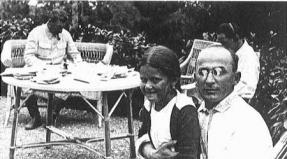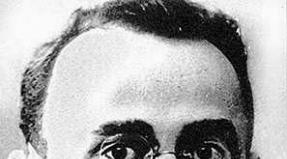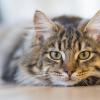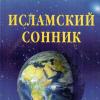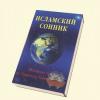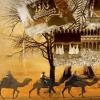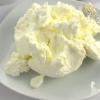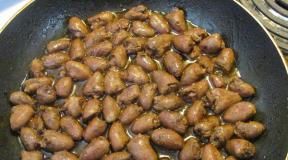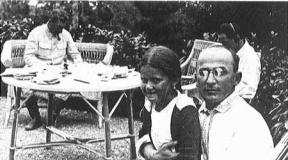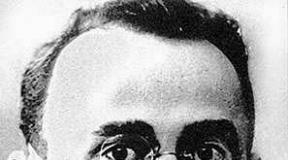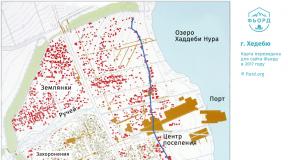How to choose an Old Church Slavonic name for a boy? History of origin and significance, as well as recommendations for parents. What names do only Old Believers have?
The split of the church in Rus' occurred in the middle of the 17th century, when, on the initiative of Patriarch Nikon, a church reform with the aim of bringing Russian religious rites into conformity with Greek Orthodox traditions. But not everyone accepted the innovations, which gave rise to the Old Believers. The Old Believers still live by their own laws, in particular, they give their children special names.
What names did the Old Believers give?
In the article “On proper names in Russian confessional groups”, Doctor of Philology, Chief Researcher of the Institute of Linguistics of the USSR Academy of Sciences/RAS Nikitina notes: “Intra-confessional and territorial variants of Old Believer culture use spontaneously formed names - a set of the most common names in a given local culture, but common the basis of all local names are the Old Believer calendar.”
So, names were given strictly according to the calendar: for boys within the first eight days, for girls within eight days before or after the date of birth. Therefore, many Old Believers bore names that were rare and almost forgotten in our time, for example: Macarius, Procopius, Savvatiy, Fevrusa, Ulita, Ermilus, Glyceria, Kallistratus, Cornilus, Sekletinya, Hermogenes, Fotinya. Moreover, one family could have several children with the same names - this was not forbidden.
Canonical and non-canonical forms
Ethnographer A.I. Nazarov in his work “Name Book of Old Believers-Priests of the Land of the Ural Cossack Army” draws attention to the fact that in the metric books of Old Believer settlements there are both canonical and non-canonical spellings of individual names. The latter, for example, include such as Aftanom, Anton, Gavrila, Efimy, Mikhaila, Stepan, Fokiy; Nastasya, Anisya, Daria, Arina, Ustina.
“Some names in the registry book for 1833 were found only in a non-canonical form,” the researcher reports, “for example, male names Avinaliy, Anisim, Anufriy, Arefiy, Kirila (Kirilla), female names Alimpiada (Elympiyada), Uliyana (Ulyana), Uliyanna (Ulyaniya). They correspond to the canonical forms Uvenalia, Onesimus, Onuphrius, Arefa, Cyril; Olympiad, Juliana, Juliana."
It is interesting that, according to the Old Believer canons, the name Nikolai is found only in the form Nikola, which existed before the so-called book right in the second half of the 17th century. According to sources, Archpriest Avvakum said on this matter: “Among the Germans there was Nikolai, and under the apostles the heretic was Nikolai, and among the saints there is no Nikolai anywhere.”
How have traditions changed?
According to S.E. Nikitina, although in the Old Believer environment there were often common names - Ivan, Maria, Peter, Anna, Vasily, Tatyana, Pavel, Natalya, along with them there were also less common ones in use - Savely, Evdokia, Karp, Efrosinya, Savvaty, Praskovya, Ulyana, Matryona, Pelageya, Akulina, Fedora, Mavra. Moreover, this happened already in the post-revolutionary period, as evidenced by documentation stored in the village councils of some Old Believer villages in the Urals and Siberia.
Sometimes young people changed their names without permission: for example, Fedora became Faina, Akulina - Lina, Pelageya - Polina, Fotinya - Svetlana (translation from Greek). Adherents of the old faith condemned such behavior: “The name cannot be changed without meaning: it was given according to the book (that is, according to the calendar) and has been tested for centuries.”
Only in the 60s of the twentieth century did the Old Believers begin to call their children names that are more traditional for us, although also available in the calendar - Andrei, Sergei, Anatoly, Ekaterina, Valentina, Galina.
Today, “Old Believers” names are found mainly among people from the Urals and Siberia, as well as among the descendants of Old Believers who emigrated to the West after the revolution. Moreover, S.E. Nikitina notes: “ Old Believer names among the Old Believers in America are also striking in their unusualness. Here, for example, are male names: Abraham, Onufriy, Lavren, Nestor, Cyprian - diminutives are not formed from them. Such female names as Minadora and Theoktista also do not have diminutive forms. Those that have them do not always coincide with those familiar to us: Praskovya - Pana, Clement - Mitka, Evdokia - Keya (from the variant of Evdokey), Fetinya - Feta. IN lately“American” names appear as diminutives: Sam (from Samuel), Sally (from Salome, Russian version - Solonka), etc.”
In ancient times, people believed that there was a magical connection between a person and his name. They believed that without knowing the main name, it was impossible to harm a person. Therefore, children were often given two names: the first - deceptive, known to everyone, and the second - secret, which only those closest to them knew. The secret name was hidden to protect the child from the evil eye and evil spirits. A false name was sometimes deliberately made unattractive to deceive evil spirits.
During adolescence, the ritual of re-naming took place. The young man was named in accordance with the expressed traits and characteristics of character that were manifested by this time.
History of origin
In the pre-Christian era, Slavic names reflected the meaning attached to the naming process. Usually the name carried positive energy and expressed the hopes and wishes of the parents. There are several options for the origin of Slavic names:
- From weather phenomena (Frost, Wind), time of day (Twilight, Zoryan).
- From natural world: fish (Ruff, Catfish), animal (Wolf, Hare), bird (Eagle, Nightingale, Raven).
- According to human qualities (Clever, Good-natured, Silent, Quiet). By character traits: Brave (brave, courageous), Veselin (cheerful, mischievous), Offended (touchy).
- According to external features (Kudryash, Mal, Chernysh). Strong Old Slavonic boys could be called: Dubynya (strong, like an oak), Gorislav (persistent, like a mountain).
- Names from verbs, adverbs (Zhdan, Khoten, Nayden, Daren).
- By birth order: numerals (Pervusha, Vtorak, Tretyak, Shestak, Nine), and ordinal (Elder, Menshak).
- From the pagan gods (Veles, Yarilo).
- Negative names were chosen to protect against the evil eye (Dashing, Zloba, Nezhdan, Durak), or as a reflection of physical disabilities (Kriv, Nevzor, Nekras).
- By occupation, profession - Kozhemyaka, Warrior, Villager. These names look like nicknames, but in fact they are confirmed by surviving documents.
- Names are derived from the names of other peoples. From the ancient German names Hrodrik, Ingvarr, Helg came the ancient Russian Rurik, Igor, Oleg.
- Compound or dibasic names made up of two roots united by a connecting vowel.
Dibasic
Most of the ancient Slavic names are represented by complex two-basic names. One root of such a name defined qualities (strength, power, might, love), and the second root showed the scope of their application (everything, people, good, gods, army). The underlying meaning of such names can be determined intuitively by ear. For example, Bogomil is dear to God, Vsemil is dear to everyone, Kazimir seems to show the world.
 The inclination towards the art of war was conveyed by names with military roots - regiment, war-, rati-:
The inclination towards the art of war was conveyed by names with military roots - regiment, war-, rati-:
- Yaropolk.
- Ratibor.
- Ratislav.
- Vojislav.
Those inclined to study spiritual sciences added the holy root:
- Svyatoslav.
- Svyatomir.
Positive qualities were determined by the roots good-, sweet-, joyful-, loving-:
- Lyubomir.
- Dobrogost.
- Radolub.
Some meanings are already difficult to determine by sound, because the meanings of words have changed. For example, the root -fat meant abundance, wealth:
- Zhiroslav.
- Domazhir.
The root -ostr (ost) meant brave:
- Ostromir.
- Witty.
The root -slav spoke of the princely origin of the name and the upper class. Craftsmen and peasants had the same names with simple suffixes and endings: -l(o), -yat(a), -sh(a), -n(ya):
- Dobroslav - Dobrynya, Dobryata.
- Putislav - Putyata, Putyatya.
- Stanislav - Became.
- Mstislav - Mestila, Mistyasha.
Evolution
 Many names of ancient Slavic men were lost after the arrival of Christianity in Rus'. To replace Slavic pagan gods with Christianity came one God. With the change in faith, there was a rejection of names that included the names of the old gods (Yarilo, Veles). Some ancient Slavic names were banned by the Christian Church.
Many names of ancient Slavic men were lost after the arrival of Christianity in Rus'. To replace Slavic pagan gods with Christianity came one God. With the change in faith, there was a rejection of names that included the names of the old gods (Yarilo, Veles). Some ancient Slavic names were banned by the Christian Church.
Old Slavonic names replaced names from the Bible (Greek, Hebrew, Roman and others). After the adoption of Christianity, children began to be named after Orthodox saints. For example, the ancient name Ivan, which formed the basis of many folk tales and seems to be originally Russian, comes from the Hebrew name John, and appeared after the baptism of Rus'.
Some of the ancient Slavic names remained in use as secular household names; they were used to call a child in the family circle. Some of these names gradually turned into nicknames.
Many ancient names formed the basis of surnames (Nezhdan - Nezhdanov, Volk - Volkov, Nevzor - Nevzorov, Nekras - Nekrasov, Molchan - Molchanov, Zayats - Zaitsev, Tretyak - Tretyakov, Zloba - Zlobov, Putyai - Putin, Orel - Orlov, Ersh - Ershov).
Some Slavic names have survived to this day almost unchanged. Vladimir, Stanislav, Vyacheslav, Vladislav - remain popular and modern today. These names were borne by rulers, princes, generals and governors, so they remained relevant for many centuries. Some Old Slavonic names were canonized by the church, name days were added for them, these names were included in church calendars and remained in use:
- Vladimir.
- Bogdan.
- Vsevolod.
- Vladislav.
- Yaroslav.
Complete list of Old Church Slavonic and their meanings
This is what the ancient names of Russian men meant:
 Bazhen (desired, beloved, God's).
Bazhen (desired, beloved, God's).- Bazan (screamer).
- Bashilo (pampered, mischievous).
- Belimir (white, bright world).
- Belogor (white mountain, sublime).
- Beloslav (white, bright glory).
- Belyai (white, light).
- Berislav (taker of glory).
- Bogdan (given by God).
- Bogolyub (God loving).
- Bogomir (Peace be with God).
- Boleslav (more glorious, most glorious).
- Borimir (fighting for peace).
- Borislav (fighting for glory).
- Bratislav (brother, friend of glory).
- Bronislav (protector of glory).
- Bryachislav (glorious warrior).
- Budimir (awakening, awakening the world).
- Burislav (stormy glory).
- Vadim (arguing, proving).
- Vadimir (attracting, calling).
- Velizar (great dawn, a lot of light).
- Velimir (great, big world).
 Velimudr (knowing).
Velimudr (knowing).- Vesilin (cheerful, cheerful).
- Vladimir (owning the world, striving for harmony).
- Vladislav (owner of fame).
- Vlastimir (ruler over the world).
- Voislav (fighting for glory, glorious warrior).
- Volodar (owner of will, ruler).
- Volga (wonder, hero).
- Vorotislav (returning glory).
- Vsevolod (who owns everything).
- Vseslav (the most glorious, generous).
- Vysheslav (above others in glory, glorified).
- Vyacheslav (most glorious, most glorious).
- Gleb (presented to God, given under the protection of God).
- Gorazd (big, large, skillful).
- Gorislav (blazing in glory).
- Gradomir (creator of the world).
- Gradislav (preserver of glory).
- Gremislav (loudly famous).
- Danislav (let him be glorious).
- Darimir (giver of peace).
- Dobrolyub (kind, loving).
- Dobromil (kind, dear).
 Dobromysl (good-thinking).
Dobromysl (good-thinking).- Dobroslav (glorified by good, glorifying good).
- Dobrynya (kind, daring).
- Dragomil (especially dear, precious).
- Dragomir (treasuring the world, beloved by all).
- Druzhina (friend, comrade, or army, detachment).
- Dusan (mental, spiritual).
- Dukhovlad (possessing the spirit).
- Yeseniy ( clear sky, clear).
- Zhdan (desired, expected).
- Zhiteslav (glorifying life).
- Zvyaga (loud).
- Zvenimir (ringing for peace, calling for harmony).
- Zlatan (golden, precious).
- Zlatomir (golden world).
- Zlatoslav (golden glory).
- Izyaslav (who gained fame).
- Izheslav (be with glory).
- Istislav (glorifying the truth).
- Casimir (bringer of peace, tranquility).
- Krasimir (beautiful world).
- Krasislav (beauty of glory).
- Labuta (clumsy, lump).
- Ladimir (pacifying, in harmony with the world).
- Ladislav (glorifying beauty, harmonious).
- Lel (loving, passionate).
 Radiant (radiant, luminous).
Radiant (radiant, luminous).- We love (beloved).
- Lubomir ( loving world, anyone in the world).
- Ljubomysl (loving to think).
- Luboslav (glorifying love).
- Lyudmil (dear to people).
- Mal, Malyuta (small, baby).
- Mieczysław (famous for his sword, glorious warrior, valiant).
- Milan (sweet, gentle).
- Milovan (affectionate, caring).
- Miloslav (sweet glory).
- Mirko (peaceful, calm).
- Miroslav (glorious in the world, glorifying the world).
- Molchan (silent, taciturn).
- Mstislav (irreconcilable, avenging glory, glorious avenger).
- Myslimir (thinking about the world).
- Hope (hope, expectation).
- Negomir (gentle world).
- Nikola (winner, warrior).
- Odinets (the only one, the first in a row).
- Oleg (sacred, dedicated).
- Ostromir (piercing, brave world).
- Witty (sharp-thinking, brave-thinking).
 Overexposure (bright, bright, clear).
Overexposure (bright, bright, clear).- Polkan (strong, quick).
- Polyuda (giant, huge).
- Wonderful (wonderful).
- Putimir (reasonable world, way of peace).
- Putislav (who glorified his path, blessed road).
- Radamir (rejoicing in peace, fighter for peace).
- Radey (joyful, joy).
- Radimir (who cares for peace).
- Radislav (rejoicing in glory, caring for glory).
- Radmil (sweet joy).
- Radosvet (light of joy).
- Ratibor (fearless warrior, winner of the army).
- Rodislav (nice by birth).
- Rostislav (growing glory, grown for glory).
- Svetozar (illuminating with light, illuminated with light).
- Svyatomir (holy world).
- Svyatoslav (sanctified by glory).
- Svyatopolk (fighter for a holy cause, holy army).
- Slawomir (glorifying the world).
- Stanislav (becoming glorious or famous by the camp).
- Stoyan (steadfast, strong).
- Tverdimir (solid world).
 Tvorimir (creating the world).
Tvorimir (creating the world).- Tihomir (quiet, peaceful, tranquil).
- Tichoslav (quiet glory).
- Khotislav (desiring glory, striving for glory).
- Brave (brave).
- Hranislav (guardian of glory).
- Czeslav (famous).
- Chudomil (wonderful, dear).
- Janislav (glorious).
- Jaromir (bright world).
- Yaropolk (bright regiment, powerful army).
- Yaroslav (bright, glorious, glorifying Yarila, the god of the Sun).
Ancient Slavic male names not only sound beautiful, but also have deep roots and sacred meanings. They carry the stamp of energy, culture and traditions of the Slavic people. Choosing Old Slavic male name, parents lay the foundations of spiritual qualities and the direction of your child’s life path, because the traits that the great ancestors possessed will be projected onto the growing boy.
Choosing a son's name is a difficult task for all parents. After all, the name will remain with the child for life, it will be his reflection. Therefore, the issue of a name for a boy must be taken seriously. At the moment there are names of different origins in the world Italian names, Kazakh, Greek, Old Russian names of boys and girls. If you decide to give your son an Old Russian name, then our article is just for you.
It should be noted that among the Old Russian names there are a huge number of beautiful and sonorous names, and if used correctly, you can significantly influence the fate of the child, that is, in the process of upbringing, strengthen the positive traits in the child’s character and develop in him good qualities. Princely names are in particular demand among Old Russian names. As a rule, men with names such as Vladimir, Vsevolod, Svyatoslav. The name Yaroslav gives the child a strong masculine character and charisma. There are also good old Russian names for boys, the owners of which were not princes, but were worthy husbands. For example, the name Bogdan (given by God). A boy named Bogdan will be a calm person who knows his worth; integrity and stubbornness are Bogdan’s striking traits. Boris (wrestlers) are smart, achieve great success, are scrupulous, and have a sense of humor. And there are many such old Russian bright and deep-meaning names.
Old Russian names for boys:
Bohumil - dear to God
Krasimir - the beauty of the world
Budislav - be glorious!
Krasislav - the beauty of glory
Boleslav - glorifying
We love - beloved
Belogor - from the White Mountains
Ludimir - bring peace to people
Beloyar - furious
Lyubomil - beloved
Bazhen - God's
Lyubomir - loving peace and peace
Bueslav - stork
Lyuborad - pleasing with love
Budimil - be nice!
Lyuboslav - glorifying love
Bogolep - divine
Ladislav - glorifying beauty
Bratislav - brother, friend of glory
Ladislav - glorifying people
Belimir - white, pure
Lubodron - beloved, dear
Bogumir - bring peace to God!
Luceslav - in a ray of glory
Borislav - stormy glory
Lubodar - giver of love
Volodar - giver of will
Ladimir - peace-loving
Vitoslav - glory of life
Peace lover - loving peace
Vlastislav - owner of the world
Milava - sweet, kind
Vladimir - owner of the world
Mlad - young
Vyacheslav - glorifying advice
Mirodar - giver of peace
Venislav - crowned with glory
Milan - sweet, kind
World - worldwide
Myslemir - thinking about the world
Vseslav - illustrious
Moguta - powerful, mighty
Vysheslav - famous; all the glory
Miloslav - sweet glory
Vlastimir - rule the world
Mladen - young
Vsemil - dear to everyone
Milorad - sweet, kind
Verislav - faithful
Hope - hope expectation
Vojislav - glorious warrior
Negomir - gentle and peaceful
Vadim - invited, invited
Found - found
Vladislav - owner of glory
Neroslav - sealer of glory
Vadislav - called
Witty - sharp thinker
Gleb - sweet, affectionate
Ocheslav - desperate glory
Gradibor - force creator
Oleg - light, fast
Gorislav - glorifying the high light
Wonderful - wonderful
Gorisvet - high light
Peresvet - bright
Gostislav - ready glory
Putislav - path of glory
Gradimir - creator of the world
Premislav - accept the glory!
Gift - gift to the world
Pervoslav - ahead of glory
Drogoslav - dear glory
Ratislav - military glory
Dobrava - virtuous, bearer
Radimil - sweet joy
Daroslav - giver of the word
Radey - joy, joyful
Deyan - active, active
Ratibor - chosen warrior
Daromir - giver of peace
Radibor - chosen from the joyful
Dobran - good giver
Ruslav - fair-haired
Daren - gift to the world
Radislav - caring about glory
Dan - given by God
Radim - sweet joy
Drogorad - dear joy
Ratmir - a fighter for peace
Drohomir - dear world
Radosvet - light of joy
Danko - shining, day
Rusimir - Russian World
Divislav - in the radiance of words
Radimir - caring for peace
Daniyar - given for shine
Radovlad - own joy
Dobrolyub - loving goodness
Svetovid - light, holy
Danislav - giver of glory
Svetozar - illuminated by light
Daromysl - thinker, thinker
Svyatoboy - holy fighter, warrior
Dragolub - kind, beloved
Svyatomir - holy world
Dobroslav - glorifying goodness
Svetovik - light
Dragovit - valuing life
Svyatorad - holy joy
Damir - the giver of peace
Tichoslav - quiet glory
Yeseniy - clear sky
Trajan - third son
Zhelan - desirable
Died - peace, tranquility
Zhelislav - desired glory
Touched - tenderness
Zhdanimir - the awaited world
Delight - delight
Zhiteslav - glorifying life
Hranimir - keep the peace
Zlatoslav - golden glory
Khvalimir - glorify the world
Zlatozar - with a clear gaze
Khvalislav - praise the glory
Zvenislav - ringing with glory
Hranislav - keep the glory
Zalazar - because of the azure
Tsvetimir - be the color of the world
Zelislav - very nice
Chudomil - sweet miracle
Zdanimir - creator of the world
Chestimir - honor of the world
Zvenimir - calling for peace
Chestislav - honor the glory
Dawn - rising light
Chtislav - honor the glory
Izheslav - be with glory!
Shchaslav - happy
Igor - militant
Jaromir - be furious in the world
Ivar - tree of life
Yaroslav - shining with glory
Idan - walking, overcoming the path
Jaromil is a nice man
Ivan - to be born, to be born
Yaropolk - furiously up in arms
Krasibor - chosen from the beautiful
Janislav - nice
A name determines a person's destiny. This is the key to his inner self. After all, it is not without reason that in Rus' a person had two names, one - false, for everyone, and the other - secret, only for the person himself and his very close people. This tradition existed as protection from unkind spirits and unkind people.
Often the first Slavic name was deliberately unattractive (Kriv, Nekras, Zloba), for even greater protection from evil ones. After all, without the key to the essence of a person, it is much more difficult to cause evil. The rite of the second naming was performed in adolescence, when the main character traits were formed. The name was given based on these traits. Slavic names were replete with their diversity; there were groups of names:
1) Names from the animal and flora(Pike, Ruff, Hare, Wolf, Eagle, Nut, Borscht)
2) Names by birth order (Pervusha, Vtorak, Tretyak)
3) Names of gods and goddesses (Lada, Yarilo)
4) Names based on human qualities (Brave, Stoyan)
5) And the main group of names is two-basic (Svyatoslav, Dobrozhir, Tihomir, Ratibor, Yaropolk, Gostomysl, Velimudr, Vsevolod, Bogdan, Dobrogneva, Lyubomila, Mirolyub, Svetozar) and their derivatives (Svyatosha, Dobrynya, Tishilo, Ratisha, Putyata, Yarilka , Miloneg).
From the listed names, it is easy to trace the process of creating a derivative name: the second part is cut off from the two-base one and a suffix or ending is added (-neg, -lo, -ta, -tka, -sha, -yata, -nya, -ka).
Example: Svyatoslav: Svyato + sha = Svyatosha.
Of course, the names of people carry a significant part of the culture and traditions of the entire people. In Russia, with the advent of Christianity, Slavic names almost completely fell into oblivion. There were lists of Slavic names prohibited by the church. Why this happened is not difficult to guess. One part of the names (Lada, Yarilo) were the names of Slavic gods, the owners of the second part were people who, even after the Christianization of Rus', tried to restore the cult and traditions (magi, heroes). Today in Russia only 5% of children are given Slavic names, which certainly impoverishes the already meager Slavic culture.
LIST OF SLAVIC NAMES
Bazhen is a desired child, desired. The names also have meaning: Bazhai, Bazhan. From these names arose the surnames: Bazhanov, Bazhenov, Bazhutin.
Bazhena - female uniform named after Bazhen.
Beloslav - From BEL - white, turn white and SLAV - to glorify. Abbreviated names: Belyai, Belyan. From these names arose the surnames: Belov, Belyshev, Belyaev.
Beloslava is a female form named after Beloslav. Short name: Beliana
Berimir - caring for the world.
Berislav - one who takes glory, who cares about glory.
Berislava is the female form of the name Berislav.
Blagoslav - glorifying kindness.
Blagoslava is the female form of the name Blagoslav. Abbreviated names: Blaga, Blagana, Blagina.
Fornication - dissolute, unlucky. One of the "negative" names. From this name arose the surname: Bludov. Historical figure: Blud - governor of Yaropolk Svyatoslavich.
Bogdan is a child given by God. The name also has meaning: Bozhko. From these names arose the surnames: Bogdanin, Bogdanov, Bogdashkin, Bozhkov.
Bogdana is the feminine form of the name Bogdan. Short name: Bozena.
Bogolyub - one who loves God. From this name arose the surname: Bogolyubov.
Bogomil - dear to God. The name also has meaning: Bohumil.
Bozhidar - gifted by God.
Bozhidara is the female form of the name Bozhidar.
Boleslav - illustrious. Historical figure: Boleslaw I - Polish king.
Boleslava is the female form of the name Boleslav.
Borimir is a peace fighter, a peacemaker.
Borislav is a fighter for glory. Abbreviated names: Boris, Borya. From these names arose the surnames: Borin, Boriskin, Borisov, Borisikhin, Borichev, Borischev. Historical figure: Boris Vseslavich of Polotsk - Prince of Polotsk, ancestor of the Drutsk princes.
Borislava is the female form of the name Borislav.
Borsch is one of the personified names of the plant world. Literally translated: Borscht is plant tops. The surname Borshchev came from this name.
Boyan is a storyteller. The name was formed from the verb: bayat - to speak, tell, sing. The names also have meaning: Baian, Bayan. From these names came the surname: Bayanov. Legendary personality: songwriter - Boyan.
Boyana is the feminine form of the name Boyan.
Bratislav - From BROTHER - to fight and SLAV - to glorify.
Bratislava is the female form of the name Bratislava.
Bronislav is a defender of glory, protecting glory. The name also has meaning: Branislav. Short name: Armor.
Bronislava is the female form of the name Bronislav.
Bryachislav - from BRYACHI - to rattle and SLAV - to glorify Historical figure: Bryachislav Izyaslavich - Prince of Polotsk.
Budimir is a peacemaker. From this name came the surnames: Budilov, Budishchev.
Velimir is a big world.
Velimira is the female form of the name Velimir.
Velimudr - knowledgeable.
Velislav - great glory, most famous.
Velislava is the female form of the name Velislav. Abbreviated names: Vela, Velika, Wieliczka.
Wenceslaus - dedicator to glory, crowned with glory.
Wenceslaus is the female form of the name Wenceslaus.
Faith is faith, true.
Veselin - cheerful, cheerful.
Veselin is the female form of the name Veselin. The name also has a meaning: Vesela.
Vladimir is the ruler of the world. The name also has meaning: Volodymer. From this name came the surnames: Vladimirov, Vladimirsky, Volodimerov, Volodin, Volodichev. Historical figure: Vladimir I Svyatoslavich Red Sun - Prince of Novgorod, Grand Duke Kyiv.
Vladimir is the female form of the name Vladimir.
Vladislav is the owner of glory.
The name also has meaning: Volodislav. Short name: Vlad. Historical figure: Volodislav is the son of Igor Rurikovich.
Vladislava is the female form of the name Vladislav. Short name: Vlada.
Vojislav is a glorious warrior. Abbreviated names: Voilo, Warrior. From these names came the surnames: Voeikov, Voinikov, Voinov. Historical figure: Voin Vasilievich - from the family of Yaroslavl princes.
Voislava is the female form of the name Voislav.
Wolf is one of the personified names of the animal world. From this name came the surname: Volkov.
Raven is one of the personified names of the animal world. From this name came the surnames: Voronikhin, Voronov.
Vorotislav - returning glory.
Vsevolod is the ruler of the people, who owns everything. From this name came the surnames: Vsevolodov, Vsevolozhsky. Historical figure: Vsevolod I Yaroslavich - Prince of Pereyaslavl, Chernigov, Grand Duke of Kiev.
Vsemil - beloved by everyone.
Vsemil is the feminine form of the name Vsemil.
Vseslav - all-glorifying, famous. The name also has meaning: Seslav. From this name came the surname: Seslavin.
Historical figure: Vseslav Bryachislavich of Polotsk - Prince of Polotsk, Grand Duke of Kyiv.
Vseslav is the female form of the name Vseslav.
Vtorak is the second son in the family. The names also have meaning: Second, Second. From these names came the surnames: Vtorov, Vtorushin.
Vyacheslav is the most famous, the most glorious. The name also has meaning: Vatslav, Vysheslav. From these names came the surnames: Vysheslavtsev, Vyacheslavlev, Vyacheslavov. Historical figure: Vyacheslav Vladimirovich - Prince of Smolensk, Turov, Pereyaslav, Vyshgorod, Grand Duke of Kiev.
Vyachko is a legendary personality: Vyachko is the progenitor of the Vyatichi.
Godoslav - The name also has a meaning: Godlav. Historical figure: Godoslav is the prince of the Bodriči-Rarrogs.
Goluba is meek. From this name came the surnames: Golubin, Golubushkin
Gorazd - skillful, capable. The surname Gorazdov came from this name.
Gorislav is fiery, burning in glory.
Gorislava is the female form of the name Gorislav.
Gorynya - like a mountain, huge, indestructible. Legendary personality: hero - Gorynya.
Gostemil - dear to another (guest). From this name came the surname: Gostemilov.
Gostomysl - thinking about another (guest). Historical figure: Gostomysl - Prince of Novgorod.
Gradimir - guardian of peace.
Gradislav - guardian of glory.
Gradislava is the female form of the name Gradislav.
Granislav - improver of glory.
Granislava is the female form of the name Granislav.
Gremislav - famous.
Gudislav is a renowned musician, trumpeting glory. Short name: Gudim. From these names came the surname: Gudimov.
Daren - gifted.
Darena is the feminine form of the name Daren. The names also have meaning: Darina, Dara.
Nine is the ninth son in the family. From this name came the surnames: Devyatkin, Devyatkov, Devyatov. Dobrogneva
Dobrolyub - kind and loving. From this name came the surname: Dobrolyubov.
Dobromil is kind and sweet.
Dobromila is the feminine form of the name Dobromil.
Dobromir is kind and peaceful. Abbreviated names: Dobrynya, Dobrysha. From these names came the surnames: Dobrynin, Dobryshin. Legendary personality: hero - Dobrynya.
Dobromira is the female form of the name Dobromir. Dobromysl is kind and reasonable. From this name came the surname: Dobromyslov.
Dobroslav - glorifying kindness.
Dobroslava is the female form of the name Dobroslav.
Domaslav - glorifying relatives. Short name: Domash - our own, dear. From this name came the surname: Domashov.
Dragomir is more valuable than the world.
Dragomir is the female form of the name Dragomir.
Dubynya - like an oak, indestructible. Legendary personality: hero - Dubynya.
Druzhina is a comrade.
The common noun has the same meaning: Friend. From these names came the surnames: Druzhinin, Drugov, Drunin.
Ruff is one of the personified names of the animal world. From this name came the surname: Ershov.
Lark is one of the personified names of the animal world. From this name came the surname: Zhavoronkov.
Zhdan is a long-awaited child. From this name comes the surname: Zhdanov.
Zhdana is the female form of the name Zhdan.
Zhiznomir - living in the world.
Hare is one of the personified names of the animal world. From this name came the surname: Zaitsev.
Zvenislava - announcer of glory.
Winter is harsh, merciless. From this name came the surname: Zimin. Legendary personality: Ataman Winter from Razin’s army.
Zlatomir is a golden world.
Zlatotsveta - golden-flowered. Short name: Zlata.
Anger is one of the “negative” names. From this name came the surnames: Zlobin, Zlovidov, Zlydnev.
Izyaslav - the one who took glory. Historical figure: Izyaslav Vladimirovich - Prince of Polotsk, ancestor of the Polotsk princes.
Sincere - sincere. The name also has meaning: Iskra.
Iskra is the feminine form of the name Iskren.
Istislav - glorifying the truth.
Exhaustion - languid (possibly associated with difficult childbirth). From this name came the surnames: Istomin, Istomov.
Casimir - showing the world.
Kazimir - the female form of the name Kazimir.
Koschey is thin and bony. From this name came the surnames: Koshcheev, Kashchenko.
Krasimir - beautiful and peaceful
Krasimira is the female form of the name Krasimir. Short name: Krasa.
Kriv is one of the “negative” names. From this name came the surname: Krivov.
Lada - beloved, dear. Name Slavic Goddess love, beauty and marriage.
Ladimir - one who gets along with the world.
Ladislav - praising Lada (love).
Swan is a personified name for the animal world. The name also has meaning: Lybid. From this name came the surname Lebedev. Legendary personality: Lybid is the sister of the founders of the city of Kyiv.
Luchezar - a ray of light.
We love - beloved. From this name came the surname: Lyubimov.
Love is beloved. The name also has meaning: Lyubava. From these names came the surnames: Lyubavin, Lyubimtsev, Lyubavin, Lyubin, Lyubushin, Lyubimin.
Lyubomila - beloved, dear.
Lubomir - loving world.
Lyubomir is the feminine form of the name Lyubomir.
Inquisitive - someone who loves to think.
Luboslav - lover of glory.
Lyudmil is nice to people.
Lyudmila is the female form of the name Lyudmil. Historical figure: Lyudmila - Czech princess.
Mal - small, junior. The name also has a meaning: Small, Mladen. From these names came the surnames: Maleev, Malenkov, Maltsov, Malyshev. Historical figure: Mal - the Drevlyan prince.
Malusha is the female form of the name Mal. The name also has meaning: Mlada. From these names came the surname: Malushin. Historical figure: Malusha is the wife of Syatoslav Igorevich, the mother of Vladimir Svyatoslavich.
Mieczysław - glorifying sword.
Milan is cute. The name also has meaning: Milen. From these names came the surnames: Milanov, Milenov.
Milana is the female form of the name Milan. The names also have meaning: Milava, Milada, Milena, Militsa, Umila. From these names came the surname: Milavin. Historical figure: Umila - daughter of Gostomysl.
- affectionate, caring.
Milorad is sweet and joyful. From this name came the surname: Miloradovich.
Miloslav - sweetly glorifying. Short name: Miloneg.
Miloslava is the female form of the name Miloslav.
Peaceful - peace-loving. From this name came the surname: Mirolyubov.
Miroslav - glorifying the world.
Miroslava is the female form of the name Miroslav.
Molchan - taciturn, silent. From this name came the surname: Molchanov.
Mstislav - glorifying revenge. Historical figure: Mstislav Vladimirovich - Prince of Tmutorakansky, Grand Duke of Kyiv.
Mstislava is the female form of the name Mstislav.
Hope is hope. The name also has meaning: Nadezhda.
Nevzor is one of the “negative” names. The surname Nevzorov comes from this name.
Nekras is one of the “negative” names. From this name came the surname: Nekrasov.
Nekrasa is the female form of the name Nekras.
Eagle is one of the personified names of the animal world. From this name came the surname: Orlov.
Osmoy is the eighth child in the family. The name also has meaning: Osmusha. From these names came the surnames: Osmanov, Osmerkin, Osmov.
Peredslava - The name Predslava also has meaning. Historical figure: Predslava - wife of Svyatoslav Igorevich, mother of Yaropolk Svyatoslavich.
Overexposure - very light. Historical figure: Peresvet - warrior of the Battle of Kulikovo.
Putimir - reasonable and peaceful
Putislav - glorifying intelligently. The name also has meaning: Putyata. From these names came the surnames: Putilov, Putilin, Putin, Putyatin. Historical figure: Putyata - Kyiv governor.
Radiohost - caring about another (guest).
Radimir is someone who cares about the world. The name also has meaning: Radomir. Short name: Radim. From these names came the surnames: Radilov, Radimov, Radishchev. Legendary personality: Radim - the progenitor of the Radimichi.
Radimir is the female form of the name Radimir. The name also has meaning: Radomira.
Radislav - one who cares about fame. The name also has meaning: Radoslav.
Radislava is the female form of the name Radislav.
Radmila is caring and sweet.
Radosveta - sanctifying joy. Joy - joy, happiness. The name also has meaning: Rada.
Reasonable - reasonable, reasonable. From this name came the surname: Razin. Historical figure: Razumnik - student of Cyril and Methodius.
Ratibor is a defender.
Ratmir is the defender of peace.
Rodislav - glorifying family.
Rostislav - growing glory. Historical figure: Rostislav Vladimirovich - Prince of Rostov, Vladimir-Volynsky; Tmutarakansky; The ancestor of the princes of Galicia and Volyn.
Rostislava is the female form of the name Rostislav.
Svetislav - glorifying light. The name also has meaning: Svetoslav.
Svetislava is the female form of the name Svetislav.
Svetlana is bright, pure in soul.
Svetlana is the female form of the name Svetlana.
Svetovid - seeing the light, perspicacious. The name also has meaning: Sventovid. The name of the Western Slavic God.
Svetozar - illuminating with light.
Svetozar is the female form of the name Svetozar. The name also has meaning: Svetlozara.
Svyatogor - indestructible holiness. Legendary personality: Svyatogor is an epic hero.
Svyatopolk is the leader of the sacred army. Historical figure: Svyatopolk I Yaropolkovich - Grand Duke of Kyiv.
Svyatoslav - sacred glory. Short name: Saint. Historical figure: Svyatoslav I Igorevich - Prince of Novgorod and Grand Duke of Kyiv.
Svyatoslav is the female form of the name Svyatoslav.
Slavomir is a peace-glorifying person.
Nightingale is a personified name for the animal world. From this name came the surnames: Solovey, Soloviev. Legendary personality: Nightingale Budimirovich - a hero from epics.
Catfish is the personified name of the animal world.
Snezhana is white-haired and cold.
Stanimir - establisher of peace.
Stanimira is the female form of the name Stanimir.
Stanislav - establisher of glory. From this name came the surname: Stanishchev. Historical figure: Stanislav Vladimirovich - Prince of Smolensk.
Stanislava is the female form of the name Stanislav.
Stoyan - strong, unbending.
Tverdimir - from TVERD - solid and MIR - peaceful, peace.
Tverdislav - from TVERD - solid and SLAV - to glorify. From this name came the surnames: Tverdilov, Tverdislavov, Tverdislavlev.
Tvorimir - the creator of the world.
Tihomir is quiet and peaceful. From this name came the surname: Tikhomirov.
Tikhomira is the female form of the name Tihomir.
Tur is the personified name of the animal world. Legendary personality: Tur - founder of the city of Turov.
Brave - brave.
Caslav - aspiring to glory.
Chaslava is the female form of the name Chaslav. The name also has meaning: Cheslava.
Chernava is dark-haired and dark-skinned. The name also has meaning: Chernavka. From these names came the surnames: Chernavin, Chernavkin.
Pike is the personified name of the animal world.
Yarilo is the sun.
Yarilo - God of fruits in the form of the sun. From this name came the surname: Yarilin.
Jaromir is a sunny world.
Yaropolk - leader of the solar army. Historical figure: Yaropolk I Svyatoslavich - Grand Duke of Kyiv.
Yaroslav - glorifying Yarila. From this name came the surname: Yaroslavov. Historical figure: Yaroslav I Vladimirovich - Prince of Rostov, Prince of Novgorod, Grand Duke of Kiev.
Yaroslava is the female form of the name Yaroslav.
At first it’s not about Smolevo at all. I once met with the patronymic Tovarishtoivovich. Its bearer was from distant Tuva. And I thought that at dawn Soviet power Comrade Toivovich was in those places (I would even like to assume in a leadership position). And not only was he a comrade and friend for all the working Old Believers there (or Old Believers, as they are also called), but one day he became the father of a particular child. But when the registry office or some other relevant body decided to record this fact, it turned out that Comrade was already friends with people in other places, but no one knew what his name was. So I had to write down - Tovarishtoivovich. My fantasy has run wild!
In my database for Smolevo there are now 772 males and 884 females. With names, of course. I warn you right away - these statistics are only for Smolevo. If in Smolevo Peters and Pauls are very rare, then in Kuzyaevo, for example, Peter is close to Ivan in frequency of occurrence. Molokovo has its own spectrum Old Believer names. There is also a peculiarity - the range of female names is several times smaller than the range of male names.
Some names are so rare for Smolevo that they appear only once. I’ll quote them here:
Abmon, Avdey, Averyan, Abraham, Agathon, Agnia, Alfer, Amelyan, Anika, Apphia, Arefiy
Bartholomew, Vlas
Davyd, Dey, Dementiy
Evdokim, Elizar, Epifan
Zakhar, Zinovya, Zot
Ion, Isaac
Capitolina, Cyprian, Cyrien, Cornilus
Lafrentius
Malofey, Markel, Melania, Mercury, Mina, Minodora, Minofy, Moses
Nazar, Nenila, Nikon
Olympius
Groin
Samoila, Samson, Saphon, Selivan, Serafima, Silanty, Sophia
Taras, Trefil
Ulita, Ustin
Fedosey, Feklist, Feofan, Fetinya, Filat
Christina
Yuvenaly, Julius
What can you say about them? Here are some you think: “Naturally, just once. Here is Dey, for example, or Zot, or Juvenaly. It’s good that we met at all.” About others: “Why are there so few Evdokimovs, Zakharovs, only one Sophia, Seraphim?” That's how it is.
And the first ten names of Old Believers Smolovo is like this:
Avdotya 83
Ivan 77
Anna 73
Marya (Maria) 61
Irina 49
Vasily 35
Marfa 33
Tatiana 31
Matryona 29
Fedor 27
The most common names. There is also a convincing leader. Avdotya is a true Smolev name.
I will also note that from revision to revision some names are spelled differently. It is not difficult to figure out that Abakum is also Avvakum in another entry, and Efimiya - Efimya - Evfimiya - Afimya, Semyon - Simeon, Finogen - Anfinogen, Akulina - Akilyana, Paraskeva - Praskovya. You just need to be careful if you work with computer search options.
It’s a little more complicated when Kharlampiy transforms into Varlam, Chrysanthus into Kirsan, and Christina (Christina) into Chrysunya.
The name Sila has undergone a truly significant transformation: Sila, Silin, Seluyan, Silanty.
But I declare this combination a champion: Armos – Anmos – Ammon – Abmon. Moreover, none of them is repeated twice, and none of these versions of the name is spelled out in the calendar, and the closest one sounds like Amos. But I did not dare to use it and named Korchagin Abmon Ivanovich by my own name. What was there to do?

